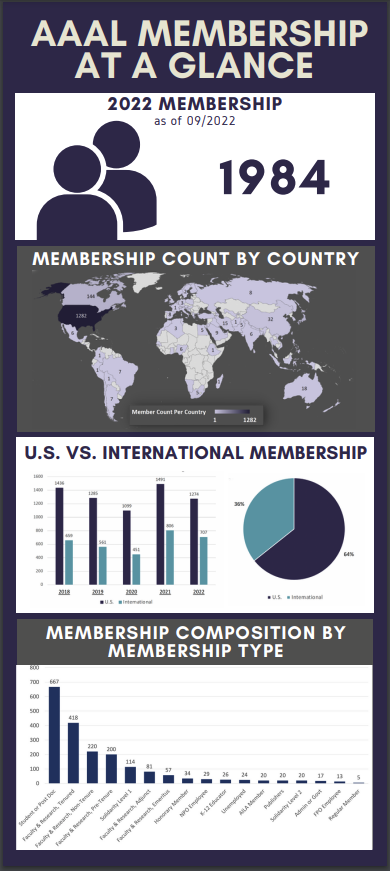AAALetter - December 2022
Volume 34, Number 3
Table of Contents
-
Letter from the Editor | Stephanie Link, Oklahoma State University
-
'Tis the Season! | AAAL President Fabiola Ehlers-Zavala, Colorado State University
-
Portland 2023 Beckons! | AAAL First Vice President & 2023 Conference Chair Peter De Costa, Michigan State University
-
"A" for Access and Also for Action | AAAL Secretary Agnes He, Stony Brook University
-
Update from the AAAL Treasurer | AAAL Treasurer Scott Jarvis, University of Utah
-
Sustaining the Future of Applied Linguistics | FFAL Chair Dudley Reynolds, Carnegie Mellon University in Qatar
-
Applied Linguistics for Social Justice | PAEC Chair Rachel Showstack, Wichita State University, and PAEC Vice Chair Bedrettin Yazan, The University of Texas at San Antonio
-
Expanding upon our Mission and Outreach | OEOC Chair Michael Amory, Oklahoma State University, and OEOC Vice Chair, Stephanie Link, Oklahoma State University
-
Mentorship is the Game in Portland | Conference Connections Chair Dustin Crowther, University of Hawai'i at Manoa
-
Onward and Upward | Graduate Student Council Co-Chairs Jacob Rieker, The Pennsylvania State University, and Oksana Moroz, Indiana University of Pennsylvania
-
Anxiety is the Focus of the 2023 Issue of ARAL | ARAL Editor-in-Chief Alison Mackey, Georgetown University
-
AILA Conferences, Awards, and Endorsements | AILA Liaison & AAAL Secretary Agnes He, Stony Brook University
-
Multilingual Research Initiatives for Increasing DEIA | AIALA Co-Convenors Laura Gurzynski-Weiss, Indiana University, and Kyria Finardi, Federal University of Espirito Santo
-
New AAAL Task Force Spotlight | Kathryn Accurso, University of British Columbia
-
AAAL Membership at a Glance | AAALetter Editorial Team
Letter from the Editor
Stephanie Link, Oklahoma State University
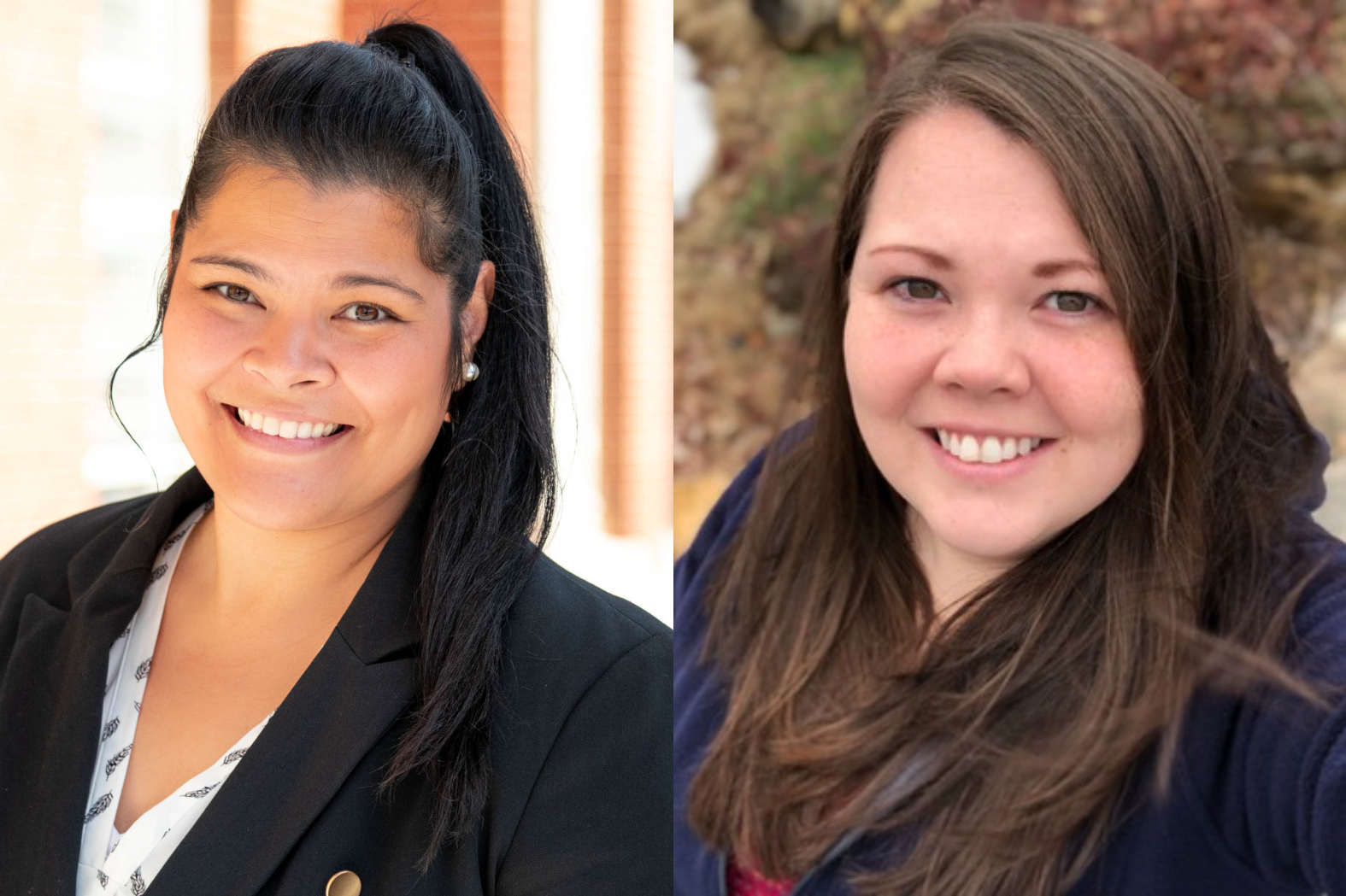
Dr. Steph Link, Current AAALetter Editor, and Dr. Sarah Hercula, Incoming AAALetter Editor
Welcome to the December issue of the AAALetter! With great pride and pleasure, I introduce you to our incoming newsletter editor—Sarah Hercula, Associate Professor of Applied Linguistics at Missouri University of Science and Technology. This issue is the result of a collaborative effort between Sarah and her new AAALetter editorial team—Sinem Sonsaat Hegelheimer and Zhaoxing Xu. Sarah’s leadership in the past months and future vision for the AAALetter leaves me deeply excited for all she has in store. As lead editor for the past six issues, I have witnessed leaders like Sarah move our organization forward in meaningful ways.
As you will see while reading the important updates in this issue, the Executive Committee, among its many initiatives, has worked hard to uplift underrepresented voices. AAAL’s standing and steering committees have expanded opportunities for AAAL members and non-members, driving professional development efforts, forming mentorship connections, and tackling relevant social issues. Finally, our AAAL members and affiliate organizations have overcome major hurdles due to the COVID-19 pandemic and the many social injustices that impact our communities. These challenges are ongoing, however, and this issue of the AAALetter shows that our members are continuously mindful of how AAAL can make a social impact. As I cycle off the editorial team and into a new role within AAAL and the Online Education and Outreach Committee, I am personally excited to see what more our organization can accomplish and what challenges we can further address and overcome. The time is ripe for being a member of AAAL!
‘Tis the Season!
Update from the AAAL President
Fabiola P. Ehlers-Zavala, Colorado State University
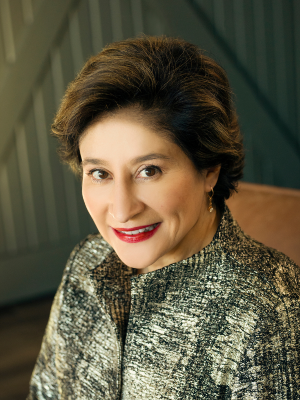
Dr. Fabiola Ehlers-Zavala, AAAL President
Greetings from Fort Collins, the ancestral land of the Arapahoe, Cheyenne, and Ute Nations and peoples—now home to Colorado State University, my home institution. In this, my last message as AAAL President, I cannot help but look back and be thankful for the opportunity to serve AAAL. The invitation to serve AAAL, facilitating the implementation of a new governance structure that will better the entire organization in years to come, has been a privilege that I accepted with humbleness, and I have been truly honored to serve. It has been an enormous responsibility that has allowed me to both directly partake in and see, in rich detail, what my predecessors together with everyone in the Executive Committee (EC), committees, councils, and task forces as well as the staff contribute to AAAL every day. All I can say, as I reflect on my experience with our organization, is that AAAL is a leading organization that has remained resilient throughout the harshest of times because its membership stands resilient and ready to innovate, and its leaders at all levels gladly serve.
With almost 2,000 members, not only from the U.S. but also from around the world, AAAL is committed to shaping the future of applied linguistics and ensuring that members of this amazing community are supported. To accomplish these goals, we need every member to participate in advancing our strategic priorities, as we seek to remain a leader in what we do, support each other, and take advantage of opportunities to gather virtually through webinars or other e-events, and/or in person through our annual conference.
All of us in the AAAL leadership are looking forward to being together in Portland this March for our AAAL 2023 conference. Our conference chair, Peter De Costa—and his entire conference planning team supported by our staff and all the volunteers that contribute along the way—has been working for over a year in preparation for our annual conference. We look forward to reuniting once more to keep building on our collective and individual professional successes that pave the way for the future of AAAL. Our annual conference allows us to build our community and expand our network of support for all who join us in this event in any capacity (organizers, reviewers, strand coordinators, presenters, participants, volunteers, etc.). Many thanks to all who contribute, whether in person or virtually!
AAAL is a vibrant community that stands together as we support those affected by world/societal conflicts and each other, particularly as we endure the losses of those who have touched the lives of so many in our field, like Bernard Spolsky—leader, mentor, scholar, and friend. While we may no longer have the privilege of his presence, his legacy remains and will continue to live in the minds and hearts of all of us.
As I look back, I would like to pause to highlight some of the key accomplishments of this year, which include the following:
-
Our annual conference. We successfully reunited for AAAL 2022 in Pittsburgh, and we had the opportunity to reconnect with each other in person. I particularly enjoyed the opportunity to meet with mentees participating in our ever-growing and incredibly successful Conference Connections initiative and hear their excitement to be back in person.
-
Mission and strategic planning. The AAAL Strategic Planning Task Force offered its deliverables, updating its mission and identifying new strategic priorities. In fact, throughout this year, we have continued to address our priorities through task forces, in particular.
-
Conference planning task force. In connection with our strategic priorities, our President Elect, Lourdes Ortega, graciously agreed to lead the Conference Planning Strategic Task Force that is discussing what AAAL may look like beyond 2025. As you may know, if all remains as anticipated, after Portland, we will meet again in Houston for AAAL 2024 and in Denver for AAAL 2025.
-
Diversity, equity, inclusion, and access (DEIA) efforts and task force. Another strategic priority is our DEIA work. DEIA is intrinsic to what we do. Our Secretary, Agnes He, leads that effort on a regular basis, ensuring that DEIA is front-and-center at our meetings and in our AAALetter. Moreover, all of us in the EC are keeping a close eye on what we do to ensure we live up to the DEIA expectations of AAAL. Many thanks go to Ashley Moore and Manka Varghese as co-chairs of the DEIA Task Force. They are working on putting forward recommendations for further DEIA enhancements at AAAL. Also, per previous appointment, in support of DEIA efforts is the work of the Nominations Committee (NomCo) Task Force led by Peter De Costa. Here, we are working to revise the NomCo guidelines to ensure the work of this committee is aligned with our DEIA values.
-
Early career scholars task force. Many thanks also go to Chair Kathryn Accurso and the members of the task force she leads to offer recommendations in support of early-career scholars. Kathryn has kept the EC appraised of their work and also reports on their ongoing initiatives in their spotlight piece later in this issue of the AAALetter.
-
Webinars. The Online Education and Outreach Committee (OEOC), currently led by Michael Amory, has continued to engage in the planning and execution of amazing webinars that have been extremely successful. These webinars have allowed us to stay together during the pandemic and have provided opportunities to those who cannot join us in person to stay connected and informed.
-
Other committees, councils, and task forces. Every year, the work of AAAL is advanced by those who participate (elected and/or appointed) across our many committees, councils, and task forces. To all of them, I extend my deepest appreciation for their amazing work and contributions. You can find details on our committees, councils, and task forces on the AAAL website. Remember that you, too, can be considered for future service involvement with AAAL and are encouraged to complete an expression of interest in volunteering.
-
Awards. Once again, excellence in research and service in applied linguistics has been recognized by the work that all our awards committee members and leaders advance. The following 2023 recipients have already been announced:
-
Aneta Pavlenko, Distinguished Scholarship and Service Award (DSSA);
-
Lee Tonouchi, Distinguished Public Service Award (DPSA);
-
Jazmin Exford, Distinguished Service and Engaged Research Graduate Student Award (DSERG) in Relation to Diversity Efforts; and
-
Mel M. Engman and Mary Hermes, AAAL Research Article Award.
Other award announcements are forthcoming.
As noted earlier, there is much work that happens in AAAL every year. What I have just highlighted is part of this work, and there is more about our work in 2022 that is yet to be announced. Some of this exciting news, however, will be revealed in Portland at AAAL 2023, so I look forward to seeing you there and sharing lots more! I can guarantee that you will be impressed and extremely thankful about how we will continue to make a difference in the future of applied linguistics and the Fund for the Future of Applied Linguistics (FFAL)! Remember that you, too, can contribute to ensure that we pave the way for the new generations, and no contribution to the FFAL is ever too small.
At this point in my message, I want to communicate a note of special thanks to our AAALetter Editor, Steph Link. I had the privilege to work directly with Steph in my previous role as AAAL Secretary, and I can only say that Steph has been an amazing leader. She has helped us take the AAALetter to the next level, and it has been a pleasure to work with her. Steph has been fully committed to leaving us in the best of hands. As of March 2023, we will be officially welcoming her successor, Sarah Hercula, who has already contributed to the production of this current issue of the AAALetter. I am very pleased to announce that Steph will move on to serve as Chair of the Online Education and Outreach Committee (OEOC), succeeding Michael Amory, with whom she has been working to prepare for her new role. I am very excited to continue to work with Steph, as she will also join the EC to continue to advance our strategic priority to enhance professional development opportunities. On behalf of all of us at AAAL, I want to deeply thank Steph Link for her excellence in service to AAAL as AAALetter Editor.
Finally, I want to thank all my colleagues in the EC with whom I have directly served through the years, from the moment that I was appointed to serve as AAALetter Editor back in 2016, then as a Secretary in 2018, and currently as President since March 2022 (see photo, below, of our fall 2022 meeting). It has been a true honor to serve with them and work, practically, on a weekly basis with several of them as we address questions, advance initiatives, and conduct our work. I also want to thank leaders across the organization who continuously support our work in any given year as well as the membership. We are all here for you, for each other, and, most importantly, for the future of AAAL.
Now, I invite you to read the contributions of my colleagues as they delve into the work they lead in greater detail!
Best wishes for the continued growth and success of AAAL. Remember, its success rests on the shoulders of all of us in various capacities. Thanks to each of you. I look forward to seeing you in Portland and/or in our webinars!
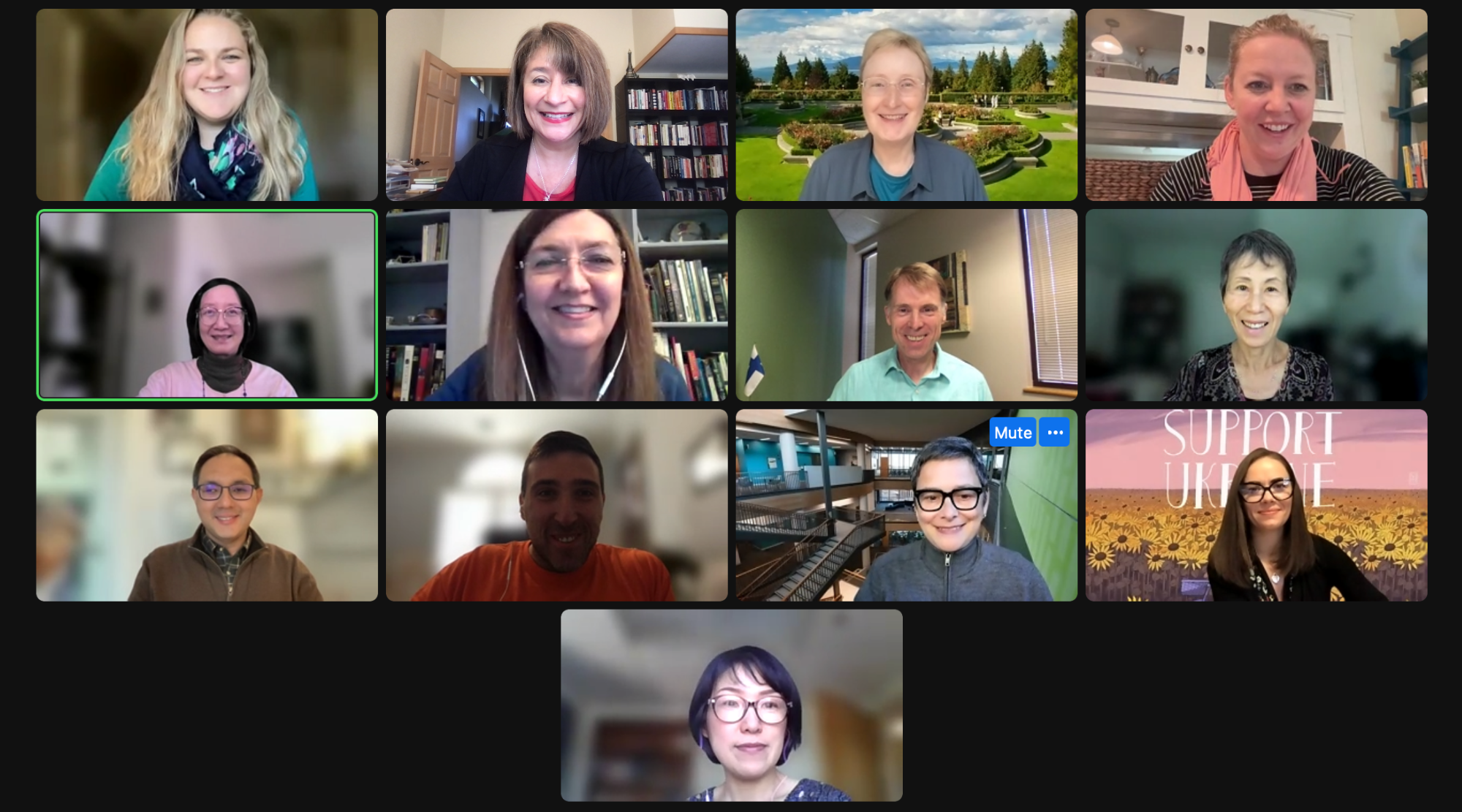
Portland 2023 Beckons!
Update from the AAAL First Vice President and 2023 Conference Chair
Peter De Costa, Michigan State University
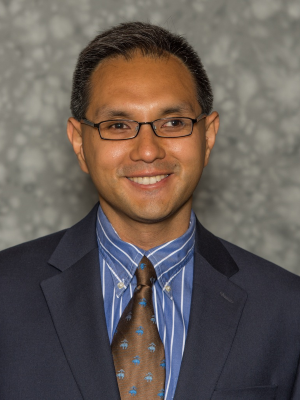
Preparations for the 2023 AAAL conference in Portland are well underway. My team and I have had the privilege of building on the momentum that Pittsburgh 2022 generated. As of November 22, 2022, 1,571 people have registered for the conference. And we expect many more to do so in the coming weeks, as they take advantage of the early-bird registration rate that expires on February 10, 2023. We will welcome at least 470 attendees from outside the U.S., hailing from Argentina to Australia, from the United Arab Emirates to Uzbekistan. As with previous AAAL conferences, Portland 2023 will be an internationally oriented conference that will bring together fellow applied linguists from all corners of the globe.
As you may recall, our conference theme is “Collaborating and Mentoring in Applied Linguistics.” To that end, we have several major events that will embody the essence of our theme. First, we will have our annual Conference Connections event, which will be celebrating its fifth year. I would like to thank the Conference Connections Chair, Dustin Crowther, and his amazing committee for organizing this very important event. If you have not registered for the conference yet, please consider signing up as a mentee or as a mentor while you register. A second event to look out for is the inaugural student research roundtable that is being organized by the Graduate Student Council (GSC). This pre-conference event, which will take place on the Friday afternoon (3/17) before the conference begins, will allow graduate students to present works-in-progress to volunteer mentor scholars. We are fortunate to have Multilingual Matters host this event and the GSC social mixer that will take place immediately after the GSC roundtable session. And on Saturday evening (3/18), conference attendees who are just starting their careers will have the opportunity to mingle with their peers at the early-career scholars networking event that is being organized by Kathryn Acurso and her team.
Given that students continue to constitute a large segment of our AAAL membership, I am pleased to inform you that, in addition to regular graduate student travel awards (e.g., the Wilga Rivers and the Educational Testing Service awards), 2023 will see an addition of four student travel awards made possible by the generosity of Duolinguo and the network of modern language teacher associations/Modern Language Journal (NFMLTA/MLJ), which are sponsoring two awards each. The Graduate Student Award Committee, chaired by Atsushi Hasegawa, has begun their arduous work of reviewing award applications (based on proposal reviewer comments and graduate student advisor recommendations) from top shortlisted graduate student proposals.
Having received over 1,900 proposals, we expect to see a record number of attendees in Portland. Not surprisingly, many submitters were waitlisted, and others turned away because of the large volume of proposal submissions. That being said, we have created more roundtable and poster presentation opportunities to accommodate as many high-quality presentations as possible. I am grateful to the 50 strand coordinators (two each for the 25 strands we have this year) and over 700 reviewers, who graciously came forward to help shortlist proposals for program inclusion.
On a separate but equally important logistical note, hotel guest rooms at the Portland Marriott Downtown Waterfront (our conference venue) are being reserved quickly. I strongly recommend that you reserve your hotel accommodation sooner rather than later. The enthusiastic response rate mentioned earlier is likely indicative of our community’s keen interest in our six plenary speakers and ten invited colloquia. We are also delighted to have two new strands—Language, Gender, and Sexuality as well as Language and the Law—in 2023. Our pre-conference workshops, which are co-organized by our local conference chairs, Alissa Hartig and Tetyana Sydorenko from Portland State University, are almost sold out. If you are planning to attend either of these workshops, please register soon.
As you can see, everything is slowly but surely falling into place. My conference team and I expect to put out a draft of the conference program before Christmas. So do look for updates on the AAAL website, and stay tuned for announcements of special events as we complete the programming! One of the major special events we have lined up for you is a jointly organized event on Sunday evening (3/19) of the conference. Faculty from Portland State University’s Departments of Applied Linguistics and World Languages & Literatures and the University of Oregon’s Center for Applied Second Language Studies (CASLS) will be showcasing recent outreach projects. Portland State will be sharing their Linguistics Road Show, an interactive set of activities designed to raise awareness of linguistic diversity on campus. And CASLS will be sharing a series of escape room puzzles designed to foster critical skills for linguistic and cultural exploration. This exciting event will highlight ways of engaging the broader community in thinking about issues in applied linguistics.
Needless to say, protective steps will be taken to ensure that the health and safety of attendees are preserved. Because we are not out of the pandemic woods, we will continue to closely watch local and world-wide developments related to COVID-19, ready to update our protocols as needed.
Finally, I must express my gratitude to my Michigan State University (MSU) conference organizing team for their tireless work. During Summer 2022, Philip Montgomery, Dmitrii Pastushenkov, and Robert Randez took leading roles in managing the strand coordinators and the reviewing process. They were assisted by Matthew (Matt) Coss and Carlo Cinaglia, who tag-teamed with the AAAL Office to ensure that lines of communication with the AAAL membership remained open. Matt and Carlo continued in this crucial communication role this past fall, while also joining the core conference program subcommittee that was helmed by Robert. This subcommittee was also made up of Kevin Fedewa and Curtis Green-Eneix. Together, we have devoted countless hours to the adjudication and scheduling process.
Equally busy have been my sponsor subcommittee, comprised of my MSU colleague, Meagan Driver, and graduate students Curtis Green-Eneix and Sol Rheem. They have been working closely with Sherry Battle, the AAAL Conference Manager, to secure sponsorships. Moving forward, another MSU colleague, Jungmin Kwon, and MSU alumna, Magdalyne Oguti Akiding, will be collaborating with Sherry to ensure that Portland 2023 is a family-friendly event. In the spirit of being environmentally friendly and to optimize search capabilities, our program will appear on an app. However, a dynamic PDF version of the program is also being developed by another subcommittee, made up of Praew Bupphachuen, Brittany Finch, Vashti Lee, and Luqing Zang. These aforementioned tasks have been made possible by the unstinting help of our AAAL Office team: Brittney Love, Sherry Battle, Hannah Queen, and Laura Haller. I hope you will take the time to meet and thank all these individuals at the conference.
We look forward to welcoming you back to Portland, a destination city that continues to draw stalwart AAAL members. Thank you for your amazing loyalty to the organization. At the same time, we welcome first-time attendees and hope that you will make AAAL your new and long-term intellectual home and community. See you soon!
“A” for Access and Also for Action
Update from the AAAL Secretary
Agnes He, Stony Brook University
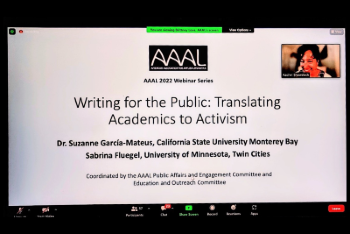
This past summer, I attended an inspiring AAAL webinar titled “Writing for the public: Translating academics to activism” (see image, right). This webinar explored the ways in which applied linguists could use our academic expertise to create scholarship for audiences beyond academia. Indeed, applied linguists are well positioned to work collaboratively with marginalized groups, social activists, and social change organizations, using our expertise, theories, methods, pedagogies, and other practices to intervene into unjust discourses, rather than waiting for others to apply applied linguistics. We are also well positioned to reach across disciplines (both familiar ones such as linguistics, psychology, and education and new ones, such as data science and computational social science) to help detect and reduce bias and injustice in language use and language databases from, for, and about different groups as we create a language-centered vision for social justice at both interpersonal and societal levels. It is in this sense that I think the “A” in DEIA (diversity, equity, inclusion, and access) should stand not only for “access” but also for “action.”
Below is a brief summary of some of the DEIA actions we have taken recently:
-
The 2022 AAAL election results showed great diversity and inclusion.
-
The 2023 AAAL Distinguished Public Service Award (DPSA) winner is Lee Tonouchi. DPSA recognizes individuals outside of the field of applied linguistics whose work (1) raises public awareness of important social issues connected to language and (2) makes exceptional contributions to promotion of multilingualism, linguistic social and justice, and language-related human rights.
-
The 2023 AAAL Distinguished Scholarship and Service Award (DSSA) winner is Dr. Aneta Pavlenko. In giving this award, AAAL recognizes that contributions to DEIA are integral to distinguished scholarship and service.
-
AAAL supported AILA’s increase of Solidarity Award funds this year and advocated for the documentation of award impact on less privileged groups and regions.
-
To facilitate presentation of papers, posters, and roundtables on Indigenous languages at the AAAL annual conference, AAAL’s Executive Committee (EC) has established a fund for scholars presenting on Indigenous languages who have limited or no access to funding.
-
In the spirit of DEIA, AAAL issued the 2023 call for nominations, inviting AAAL members to self-nominate or nominate other candidates to run for election to serve the Association in leadership positions.
-
During the October 2022 EC meeting, a motion passed unanimously that AAAL update its Standing Rules to change from binary pronoun usage to gender neutral/non-binary language and to attend to these revisions as soon as possible.
-
Thanks to the efforts of the Online Education and Outreach Committee (OEOC)—and a recent collaboration with the Public Affairs and Engagement Committee (PAEC)—our webinars have had a great impact, helping the membership learn about bias, build key skills, and work across boundaries. The October 2022 webinar, “Expanding and localizing efforts to prioritize critical language awareness,” attracted over 500 registrants and over 140 attendees.
I would like to end this piece with a question. Existing research indicates that DEIA actions are necessary and important to realize the potential benefits of a diverse workforce, a diverse field of inquiry, and a diverse society. Groups, fields of inquiry, and professional associations composed of people with diverse experiences and areas of expertise tend to be more creative and innovative, as they represent different perspectives and ask different questions, which, in turn, lead to new and more just insights and outcomes. My question is this: How can we measure progress toward greater DEIA efforts (beyond indirect measures, such as member demographics or engagement surveys)? Where (else) should we focus our efforts and resources? What are the needs of different groups? How do we measure DEIA actions themselves? I welcome your thoughts and suggestions, as always.
AAAL Financial Updates
Update from the AAAL Treasurer
Scott Jarvis, University of Utah
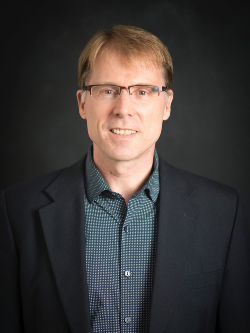
Dr. Scott Jarvis, AAAL Treasurer
My past AAALetter pieces have delivered mainly good news, but this year’s rising costs, poor investment performance, and various other challenges have put us in a tight spot going into the 2023 budget year. Here’s a rundown of where we stand at the moment.
Our financial ledgers for January through October of 2022 show a year-to-date (YTD) net operating loss of roughly $3,500. This is better than we had expected, as we had projected a net loss of nearly $17,000 for 2022—it appears that we will do much better than this. However, our investments have lost approximately $150,000 in value this year, so our overall YTD deficit for the year is close to $155,000. YTD membership dues have also decreased by about $25,900 (14%) in comparison to the same time last year but are trending slightly ahead of our 2022 projections. YTD conference revenue is at $270,700, compared to $227,100 at the same time last year.
Our total YTD expenses in 2022 are $497,600, which is $188,300 more than a year ago, due to higher conference expenses for our in-person conference in Pittsburgh in 2022 versus our virtual conference in 2021. Our YTD expenses for 2022 have remained closely in line with our projected budget for the year.
Our checking account balance on October 31, 2022 stood at roughly $290,000, which represents a decrease of about $50,000 from the same time last year. This difference is due mainly to the fact that we transferred $50,000 from checking to investments in March 2022. Our overall net assets as of October 31, 2022 were roughly $1,200,000.
The AAAL Budget Committee is finalizing our budget for 2023. Due to the fact that our membership numbers (and membership dues) have not been keeping pace with inflation and new costs, we anticipate that our expenses may exceed our revenue by as much as $50,000 for 2023. We are working to cut costs and increase revenue for 2023 while also working strategically to prevent deficit spending in 2024 and beyond. We will try to avoid raising membership dues, but conference registration fees might need to be increased for the 2024 conference.
Some of our best financial news relates to your contributions to the Fund for the Future of Applied Linguistics (FFAL). Please look for updates from FFAL Chair Dudley Reynolds in both the AAALetter and at the annual conference in Portland. There are lots of exciting things happening in this area. Thank you for your generosity and please consider contributing to the FFAL if you have not already done so.
I look forward to seeing you in Portland in March!
Sustaining the Future of Applied Linguistics
Update from the Chair of the Fund for the Future of Applied Linguistics (FFAL)
Dudley Reynolds, Carnegie Mellon University in Qatar
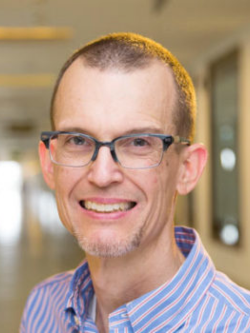
Dr. Dudley Reynolds, FFAL Chair
Since 2004, the Fund for the Future of Applied Linguistics (FFAL) has been supporting travel and participation for 4–6 graduate students each year at the AAAL conference. In order to continue supporting this number, however, in February 2021, the FFAL trustees recognized a need to increase the endowment by $65,000 (to $225,000), and they set a goal of doing so by the time of the Portland conference in March 2023. It is now December 2022, and March is just around the corner!
To date, the Campaign to Sustain the Future of FFAL has raised approximately $37,000 through over 500 individual donations. The trustees are asking for your help in raising the additional $28,000 over the next 3 months.
A special page for donating to the Campaign has been set up on the AAAL website. To recognize the generosity of donors, six levels of sponsorship have been established with donors at each level updated monthly:
-
Engagement Circle: up to $99
-
Cornerstone Circle: $100–$499
-
Leadership Circle: $500–$999
-
Foundation Circle: $1000–$2499
-
Benefactor Circle: $2500–$4999
-
Sustainer Circle: $5000 and above
Donations of any amount will make a significant contribution to FFAL’s ability to continue supporting our graduate students and, more generally, the field of applied linguistics.
In addition to the opportunity for individual donations, consider donations from a group that honor colleagues’ promotions, retirements, or other life events. What better way to acknowledge an individual known for mentoring students in the field than to donate to this campaign?
Applied Linguistics for Social Justice
Update from the Public Affairs & Engagement Committee (PAEC) Chair and Vice Chair
Rachel Showstack, Wichita State University, and Bedrettin Yazan, The University of Texas at San Antonio
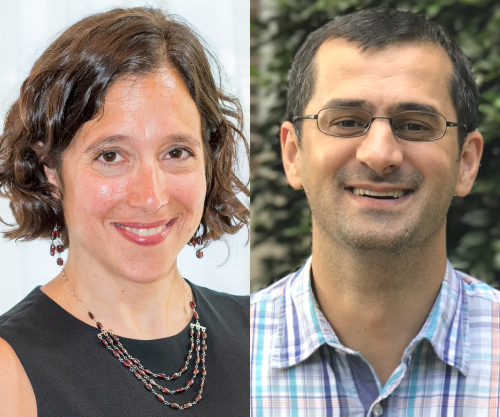
Dr. Rachel Showstack, PAEC Chair, and Dr. Bedrettin Yazan, PAEC Vice Chair
Have you been looking for a meaningful professional outlet in which to respond to current world events? Are you interested in collaborating with other applied linguists to advocate and mobilize for social change? Then we encourage you to get involved in the work of the AAAL Public Affairs and Engagement Committee.
What is the PAEC? Who serves on the committee?
The Public Affairs and Engagement Committee (PAEC) is made up of scholars/practitioners with a range of expertise in applied linguistics topics relevant for social change: Katherine Moran, Lourdes Ortega, Rachel Showstack, Amelia Tseng, Bedrettin Yazan, and Mario López-Gopar as well as graduate student representative Jacob Rieker. The PAEC is a standing committee of AAAL formed in December 2016 as “an important means by which AAAL members can bring their collective expertise to bear on issues of social importance and inform public debate by speaking to issues of social and professional relevance.” The PAEC exists to (1) represent the AAAL membership in relation to public issues and (2) facilitate AAAL members’ involvement in issues of public importance.
This year, we have been focused on preparing AAAL members to draw on our expertise as applied linguists to disseminate our scholarship and share our perspectives for audiences beyond academia.
What does the PAEC do?
Since 2017, the PAEC has focused on creating position statements, endorsing professional organization and congressional statements, participating in advocacy and social justice events at AAAL and TESOL, and building membership in the applied linguistics and social justice listserv. In recent years, we have also organized annual webinars on topics related to public engagement.
On August 3, 2022, the PAEC and the Committee for Online Education and Outreach collaborated to present the webinar “Writing for the public: Translating academics to activism” with presentations by Dr. Suzanne García-Mateus from California State University Monterey Bay and Sabrina Fluegel from the University of Minnesota. This webinar and other past AAAL webinars can be viewed on the AAAL website.
Continuing in the same vein of writing for the public, we collaborated with the OpEd Project to offer an exciting opportunity to AAAL members: AAAL and the OpEd Project will sponsor a select group of members who will receive funding to participate in the OpEd Project’s “Write to Change the World” workshops in 2023. The call for applications is now open; applications are due by January 1, 2023 and selected participants will be notified by February 15.
The PAEC also facilitates the creation and dissemination of applied linguistics briefs (one-page texts on language-related topics of potential interest and importance written in language that would be accessible to people outside our field). The briefs and the instructions for authors can be found on the AAAL website.
How can you get involved?
AAAL members are welcome to get in touch with ideas for projects and initiatives of social concern. For example, you can propose briefs, position statements, and endorsements and work with other scholars/practitioners to create op-ed pieces, blog posts, social media outreach, and webinars relevant to the membership and the public at large. Please feel free to contact Rachel Showstack with your ideas.
We encourage AAAL members to join the applied linguistics and social justice listserv (330 AAAL members strong), an online collaborative space for sharing ideas, resources, publications, and initiatives focused on applied linguistics and social justice.
We’re looking forward to working with you!
Expanding upon our Mission and Outreach
Update from the Online Education and Outreach Committee (OEOC)
Michael Amory, OEOC Chair, Oklahoma State University, and Stephanie Link, OEOC Vice Chair, Oklahoma State University
As we continue our third term as an official standing committee within AAAL, we are actively looking for new ways to engage with and support both members and non-members of AAAL. As our mission and outreach continue to grow along with the AAAL community, so, too, has the composition of our current subcommittees. Recently, our subcommittees have recruited additional members in order to bring to fruition several of our strategic goals and plans. In this newsletter piece, each subcommittee, in turn, will provide an overview of their current state-of-affairs and briefly detail their current initiatives.
Please be sure to follow us on our various platforms to learn more about what the OEOC is planning and to stay up-to-date with news and events from AAAL: AAAL website, AAALetter, Twitter, Facebook, LinkedIn, and Instagram. In addition, if you have any comments, ideas, or feedback, please contact us.
AAAL website and content development
Subcommittee Chair: Joe Cunningham, Georgetown University
This past July and August 2022, we held interviews to recruit new subcommittee members who will help to advance the mission of our subcommittee. We are fortunate to welcome Botagoz Tusmagambet (Carnegie Mellon University) as a new member. Botagoz will be joining continuing members Farah Akbar (Teachers College, Columbia University) and subcommittee Co-Chair Marda Rose (The Bishop's School, San Diego, CA).
During the 2022 annual AAAL conference in Pittsburgh, our subcommittee successfully launched the AAAL Oral History Project and was able to record the stories of 19 individuals and their experiences with AAAL. Our plan is to continue to review and edit these oral history recordings and to produce a promotional video from the collected footage in order to drive interest for the 2023 conference in Portland. These stories will eventually be compiled and shared on the AAAL website. Our goal is to further document historical information for the organization and to collect additional oral histories, whether via a virtual interview or using a dedicated space at the 2023 conference. In addition, one of our priorities is to review the AAAL website in advance of the 2023 conference and to recommend changes to enhance the navigability of the overall website and the visibility of particular resources, especially with regard to the webinar recordings featured on the site.
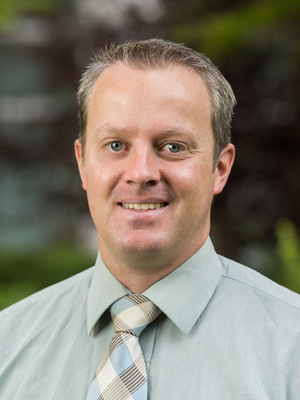
AAAL professional development
Subcommittee Chair: Steve Moody, Brigham Young University
We sincerely thank Stephen Skalicky, who recently completed his service as chair of the professional development subcommittee. His hard work and leadership has laid the foundation for the subcommittee’s work, which continues to shape our direction as we move forward. We welcome four new members to our subcommittee: Amable Ribeiro (University of Arizona), Jim Mischler (Northwestern State University of Louisiana), Ying Xiong (Pennsylvania State University), and Yunwen Su (University of Utah). They join continuing members An Sakach (Arizona State University) and Gena Bennett (English Language Specialist).
Over the next several months, we are working toward implementing a workshop series that will bring AAAL members together to work on professional development projects, such as preparing conference presentations, writing grants and abstracts, and learning research methodologies. Keep an eye out for an announcement to register for our first workshop on preparing conference presentations, which we anticipate will be held in late January 2023. We are also developing a professional development blog, which we anticipate will be launched sometime next year, that will feature information on professional development resources and opportunities on a wide variety of topics. Please stay tuned for more information about the launch as well, including, eventually, a call for guest authors for those who have resources they would like to share with the AAAL community.
AAAL social media
Subcommittee Chair: Svetlana Koltovskaia, Northeastern State University
In July 2022, our subcommittee welcomed a new member, Yixuan Wang (University of Georgia), who joined continuing members James Coda (University of Tennessee) and Peggy Semingson (University of Texas). In addition to expanding our subcommittee, we also increased our social media channels by starting our Instagram page with the help of José Pinto. The subcommittee has been working diligently to increase our presence on our social media platforms. On Facebook, we currently have 14,672 followers who are accessing our posts from contexts such as Egypt, Thailand, and Bangladesh. On Twitter, we currently have 15,935 followers (an increase of 185 in the last 28 days) with 19 tweets in the last 28 days. Top tweets include the following: proposal notification posts for AAAL 2023, a webinar reminder, and the tweet about the AAAL 2023 Distinguished Scholarship and Service Award (DPSA) winner, Aneta Pavlenko. On LinkedIn, we currently have 82 followers, while on Instagram, we have 79 followers from all over the world. Through our social media, we have been actively promoting various resources that can be found on the AAAL website, such as the Public Affairs and Engagement Committee (PAEC) briefs, awards, and webinars, all with the purpose of increasing the visibility of those resources. We also have been monitoring our social media platforms for “reasonable accuracy and non-hateful speech.” Going forward, the subcommittee will continue to strategize to build more engaging posts that will meet the needs of all members of our organization.
AAAL webinar
Subcommittee Chair: Katherine Christoffersen, The University of Texas Rio Grande Valley
In July 2022, our subcommittee grew from three to 14 members. This growth has allowed us to implement a mentoring model wherein a more experienced member works with a newer member on any given webinar. On August 3, we held a webinar entitled “Writing for the public: Translating academics to activism,” which was a collaboration between PAEC and OEOC. Suzanne García Mateus and Sabrina Fluegel presented this webinar; 200 people registered and 68 attended. Subcommittee member Lesley Smith organized this webinar. On October 17, the webinar “Expanding and localizing efforts to prioritize critical language awareness: Opportunities, challenges, and ways forward'' included presenters Tracy Quan, Ellen Serafini, Sergio Loza, Claudia Holguín Mendoza, Angélica Amezcua, and Jennifer Leeman. For this webinar, 560 people registered and 140 attended. Due to the large number of registrants, we shifted from a “meeting” to a “webinar” format, where attendees could participate through the chat or Q&A features only in order to safeguard from Zoom bombing. Webinar subcommittee Co-Chair Haley DeKorne and subcommittee member Sangeeta Bagga-Gupta organized this webinar. This webinar had a marked increase in the number of registrants and attendees, which may be related to several changes: (1) a new updated webinar flier developed by José Pinto, formerly of the AAAL Office, (2) an earlier “save the date” sent out in advance, (3) the invitation for both members and non-members to attend these events, and (4) the statement that anyone who registers will receive a link to the webinar recording. We believe our webinars represent an opportunity for engagement, visibility, outreach, and recruitment for AAAL. As such, on October 17, our subcommittee member and AAAL President Fabiola Ehlers-Zavala welcomed non-members and invited them to join AAAL, to join us at the AAAL conference, and to follow our AAAL social media accounts. Webinar recordings are also available to view.
Our next webinar, entitled “Multidialectal & Multilingual Practices in L2 Arabic Learning Contexts,” will take place on December 12. It will feature Khaled al Masaeed, Emma Trentman, Lama Nassif, and Sonia Shiri. In February 2023, we will host a webinar to highlight the authors of the 2022 special issue of ARAL, and we are actively planning other webinars as well. Follow AAAL on social media to stay informed of upcoming webinars!
AAALetter
Subcommittee Chairs: Stephanie Link, Oklahoma State University, and Sarah Hercula, Missouri University of Science and Technology
This issue has come to fruition through the combined efforts of our incoming editor, Sarah Hercula, and our outgoing editor, Steph Link, as well as the rest of the AAALetter team: Agnes He, our liaison to the Executive Committee (EC); Sinem Sonsaat Hegelheimer, subcommittee member; and welcoming Zhaoxing Xu, our newest subcommittee member! As Steph transitions away from our subcommittee—still, thankfully, remaining in her role as Vice Chair of the OEOC standing committee—we want to acknowledge all of her hard work and dedication during her leadership of the subcommittee over the last several years. She has significantly improved the behind-the-scenes organization of the newsletter as well as the quality and readership of the issues she has edited. We will miss her greatly on our team and wish her well in her continuing leadership of the OEOC and beyond.
We welcome your ideas and suggestions as we look to the future of the AAALetter. In coordination with the EC, we plan to implement a new structure for our next (June) issue of the newsletter—so stay tuned! We look forward to continuing to improve our communications with the AAAL membership.
Mentorship is the Game in Portland
Update from Conference Connections Committee Chair
Dustin Crowther, University of Hawai’i at Mānoa
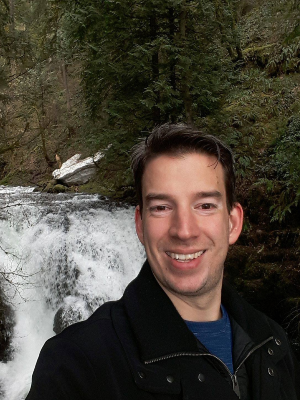
Aloha everyone! My name is Dustin Crowther, and I am privileged to be chair of the AAAL Conference Connections committee for the 2023 conference in Portland. For those who are unaware, the Conference Connections committee strives to provide AAAL’s student members with structured opportunities to receive mentorship from more senior members of the field of applied linguistics. The 2023 conference will be our fifth year in operation, and given the conference theme for 2023, which is “Collaborating and Mentoring in Applied Linguistics,” we couldn’t be happier to be continuing our work.
Through Conference Connections, AAAL provides student members with two forms of mentorship, generally through 30–60-minute meetings during the annual conference. For students in the earlier stages of their studies, we offer general mentoring support, which focuses on topics such as navigating the annual AAAL conference, writing successful conference/research proposals, and becoming more involved in the field of applied linguistics during graduate study. Such offerings generally occur in small groups with one mentor and 2–3 mentees with shared scholarly interests, when possible. For those further along in their studies, we offer one-on-one mentorship with a focus on topics such as converting conference presentations into publications, securing funding for research, and considerations tied to the academic job market.
As the new committee chair, I’d like to say a big “thank you” to Bethany Gray (Iowa State University) for her exemplary leadership these past two years as committee chair, without whom we would not have been able to navigate either the online nature of the mentorship during the 2021 conference or the transition back to in-person mentorship for the 2022 conference in Pittsburgh. The contributions that Bethany has made to the entire Conference Connections program cannot be overstated. While we thank Bethany for her contributions, we would also like to welcome our newest committee members, which include Romy Ghanem (Northern Arizona University) and Oksana Moroz (Indiana University of Pennsylvania), who has joined us as a representative of the AAAL Graduate Student Council.
Preparations for 2023 have already begun, with conference registration including initial information regarding Conference Connections. All students registering for the conference will have the opportunity to register for our mentorship program, while non-students registering will be able to indicate their interest in serving as mentors. Once again highlighting the theme of the 2023 conference, we are encouraging as many of our attendees as possible to get involved. We look forward to seeing everyone in Portland, and please do not hesitate to reach out to me if you have any questions regarding how you may become involved with our program.
Onward and Upward
Updates from the Graduate Student Council (GSC) Co-Chairs
Oksana Moroz, Indiana University of Pennsylvania, and Jacob Rieker, The Pennsylvania State University
The Graduate Student Council (GSC)—comprised of the event planning, diversity, social media, and newsletter subcommittees—has started the 2022–2023 academic year with several initiatives and events to support the graduate student community of AAAL. In particular, the event planning subcommittee organized its first webinar of the academic year, which took place on Tuesday, September 13. The theme of the webinar was "Antiracist and decolonial applied linguistics." A total of 80 students participated in the webinar. The second webinar, “Teaching while Grad Schooling,” will take place on Monday, December 5, 5:30–7:00 PM EST.
The diversity subcommittee conducted a diversity survey geared towards understanding how the GSC can better serve our graduate student community and acquire an understanding of the experiences of graduate student members of AAAL. The subcommittee received 60 responses and is now analyzing the survey results, enabling us to develop our events and conference planning to improve students’ experiences. In addition, the social media subcommittee is in the process of organizing a YouTube speaker series focusing on a wide variety of important issues in applied linguistics. The first speaker, Dr. Suresh Canagarajah, has accepted an invitation to speak about “Multilingualism in the Global South.” The social media team will include approximately five speakers over the academic year.
Graduate students are also being approached to contribute to the AAAL GSC blog. The newsletter subcommittee has closed the call for submissions for the fall issue of the AAAL Grads newsletter and is now in the editing and revision process, planning to publish the issue in early November. Another issue is planned to be published around the annual conference.
Conference preparation, inaugural events, and panels
The GSC is currently well underway with our preparations for AAAL 2023. In line with our focus on promoting graduate student development, we are undertaking several initiatives to make the conference relevant and meaningful for graduate students. In this vein, the GSC is proud to announce the establishment of the inaugural “Multilingual Matters Graduate Research Roundtable and Social Mixer.” This free event—which will take place the Friday before the conference (3/17), 4–8 PM in the Mt. Hood Room—is centered on leveraging graduate student development through discussion of ongoing projects with faculty and peer mentors. The planning team is hard at work organizing the ideal shape and substance of the event to make this event worthwhile for graduate students. More information on this event can be found in the November issue of the AAAL Grads newsletter.
The event planning subcommittee has organized two panels during lunchtime on Saturday (3/18) and Sunday (3/19) based on themes of collaboration and mentorship. “Reimagining collaboration in applied linguistics” will take place on Saturday, 12:35–1:35 PM in Mt. St. Helens, and “Cultivating positive mentorship relationships in graduate school and beyond” will take place on Sunday, 12:35–1:35 PM in Mt. St. Helens.
Lastly, the diversity subcommittee is planning to engage in an outreach project led by Jason Mizell for graduate students to provide mentorship to U.S. high school students around the time of the conference. The initiative is designed to help create a pipeline for high school students enrolled in world language courses to see applied linguistics as valuable and to consider pursuing careers in language-learning fields.
The GSC is also running a roommate finder program to help reduce lodging costs during the conference.
Design competition
We are also happy to announce the 2023 AAAL design competition. Winners will have their designs featured on apparel and accessories sold on Teespring. All proceeds will support graduate students and the Fund for the Future of Applied Linguistics (FFAL). Please consider sharing your artistic talent for this important effort!
Participants must be AAAL student members at the time of the submission. The selected artist will be publicly recognized at the 2023 AAAL conference. The GSC will also sponsor an early-bird registration fee ($119) for the 2023 conference for the winner. More information can be found on our social media and website.
Team spotlight
Finally, we would like to recognize the graduate students who serve as leaders and members of the GSC subcommittees for their time and dedication to AAAL. We value your proactive position and appreciate your time serving our diverse community of graduate students. We look forward to the conference and its numerous events to connect, network, collaborate, and learn from and with our fellow graduate students. You can find more information about Sophia Minnillo (event planning), Valentino Rahming (diversity), Paul J. Meighan (social media), and Alyssa Wolfe (newsletter) on the GSC website.
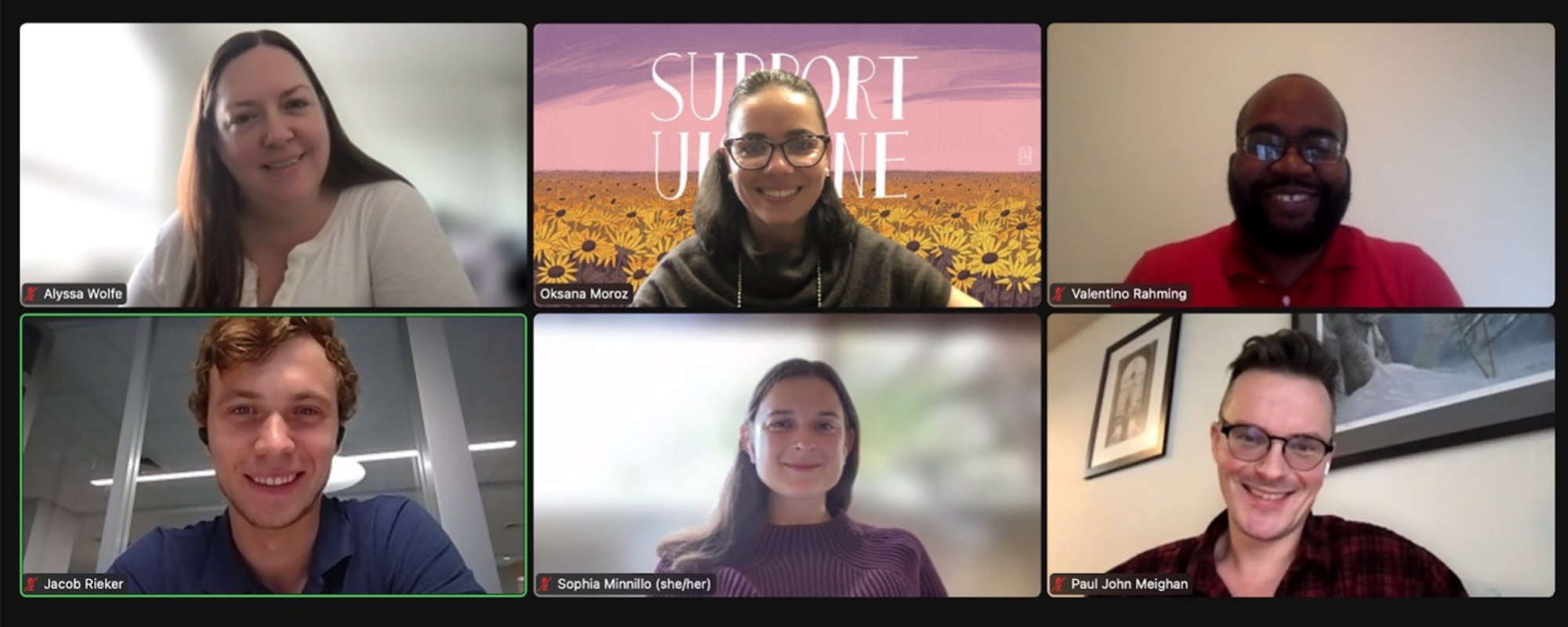
GSC members (from top left): Alyssa Wolfe, Newsletter subcommittee; Oksana Moroz, Co-chair; Valentino Rahming, Secretary and Diversity subcommittee; Jacob Rieker, Co-chair; Sophia Minnilo, Event Planning subcommittee; and Paul John Meighan, Social Media subcommittee
We aim to provide content to best serve the AAAL graduate student community and highly appreciate and value your input. If you have any suggestions or questions regarding our future initiatives, please contact us.
If you want to learn more about GSC events and/or become a part of the GSC team, please follow us on our social media to keep updated about our events and calls: GSC website, Facebook, Twitter, YouTube, and Instagram.
Anxiety is the Focus of the 2023 Issue of ARAL
Update from the Annual Review of Applied Linguistics (ARAL) Editor-in-Chief
Alison Mackey, Georgetown University
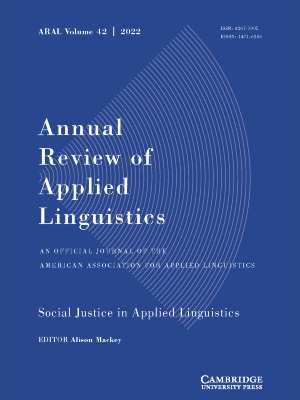
The editorial board of the Annual Review of Applied Linguistics is excited to announce that the upcoming (2023) issue will be on the topic of L2 anxiety, broadly construed. The journal’s composition of long and short article types—including position pieces, empirical reports, syntheses, and reviews—lends itself well to a review of this dynamic, interdisciplinary field of research. This year’s issue will include contributions from the following authors (in alphabetical order by last name): Elouise Botes, Ming Ming Chiu, Jean-Marc Dewaele, Nicola Fraschini, Julia Goetze, Tammy Gregersen, Hassan Khajavy, Jim King, Ju Seong Lee, Peter MacIntyre, Kate Maher, Rachid Meftah, Gökhan Öztürk, Mostafa Papi, Prem Phyak, Ekaterina Sudina, and Yu Tao. These authors explore the topic of L2 anxiety in a variety of ways through (1) empirical investigations, which include participants from a range of linguistic backgrounds and geographic locations; (2) position papers, which address a broad spectrum of questions concerning foreign language teacher anxiety, assessment and feedback, language processing, and research practices; and (3) syntheses exploring different strategies for reducing anxiety.
As in previous years, ARAL is committed to Open Science, so the journal continues to award articles with badges for Open Materials and Open Data. Open Access to all the pieces in the previous (2022) issue on social justice is on a rotating basis, and we will have the same arrangement for the 2023 issue.
ARAL also welcomes a new member to the ARAL editorial board this year: Prem Phyak (The Chinese University of Hong Kong), who, as well as joining the board, will contribute a piece to the upcoming issue of ARAL on L2 anxiety. In addition to our newest board member, we also welcome a new editorial assistant to our team for Fall 2022—Alexandra Gehrke.
Finally, ARAL is looking forward to the February 2023 AAAL webinar that will feature the authors who contributed to the 2022 special issue on social justice. For more information, see the Online Education and Outreach Committee (OEOC) article in this issue of the AAALetter, and follow AAAL social media for further updates!
AILA Conferences, Awards, and Endorsements
Update from the AILA Liaison and AAAL Secretary
Agnes He, Stony Brook University
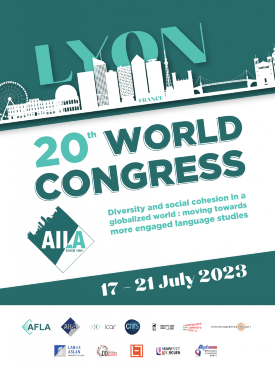
As I promised in the last issue of the AAALetter, here are some highlights from the International Association of Applied Linguistics-Executive Board and International Committee (AILA-EBIC) meeting held in August 2022. The meeting was facilitated by Laura Gurzynski-Weiss, Secretary General of AILA. I participated in the meeting as AAAL Secretary, representing AAAL, along with representatives from over 30 AILA affiliate associations around the world.The AILA World Congress will take place in Lyon, France in 2023 and in Kuala Lumpur, Malaysia in 2024, as part of the celebration of AILA's 60th birthday. At the August 2022 EBIC meeting, Vancouver was selected as the venue for AILA World Congress in 2027.
Once again, I would like to provide a reminder that AILA provides benefits to members of its affiliate associations. In addition to international collaborative research opportunities afforded by Research Networks (ReN), AILA has just increased its number of Solidarity Awards, which are for scholars who cannot participate in the AILA World Congress without financial support. Full awards cover reasonable travel costs, accommodation, and conference fees; travel awards cover reasonable travel costs and conference fees. Representing AAAL, I fully supported the proposal to increase the number of awards and suggested that AILA institute ways to assess the concrete impact of these awards, not only for the individual recipients but also for the regions/associations they represent.
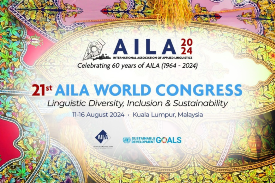
As you may have read from the AAAL webpage, AILA endorsed the AAAL ethics guidelines! Congratulations to Peter De Costa, the Ethics Guidelines Task Force he led, the AAAL Executive Committee (EC), and everyone who developed and supported these guidelines. What follows is AILA’s rationale for the endorsement: “The AAAL Ethics Guidelines offer suggestions for how to engage in ethical practice toward preparing graduate students for professional and academic careers in applied linguistics. Although the focus is on graduate students, the guidelines are also directed to researchers and teachers as they describe practices with which to facilitate ethical, constructive, and transparent relations among faculty and students.” The other document endorsed by AILA at the August 2022 meeting is the ReN guidelines for open scholarship in applied linguistics. Each AILA endorsement results in a brief introduction of the endorsed policy and a hyperlink to the policy itself, as published by the AILA partner organization or national affiliate. By formally recommending such policies, AILA aims to motivate, inspire, and support its national affiliates to develop their own policy of regionally anchored good practices in applied linguistics.
Finally, I would like to encourage everyone to subscribe to the AILA newsletter to stay informed and engaged.
Multilingual Research Initiatives for Increasing DEIA
Update from the AIALA Co-Convenors
Laura Gurzynski-Weiss, AILA Secretary General, Indiana University, and Kyria Finardi, AILA Vice President, Federal University of Espirito Santo
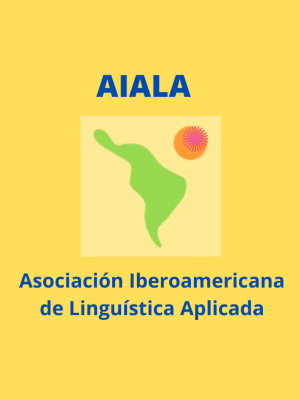
The Ibero-American Association of Applied Linguistics (AIALA, by its abbreviations in both Spanish and Portuguese), is a regional organization of the International Association of Applied Linguistics (AILA) launched in 2020 to support and amplify representation of Spanish, Portuguese, and affiliated minoritized and indigenous languages—both the multilingual applied linguistics research as well as the applied linguists who speak these languages worldwide.
AIALA at AAAL 2023
We look forward to engaging with AAAL members in Portland at AIALA’s roundtable discussion “Multilingualism as an agent of empowerment and wellbeing” (Sergio Adrada-Rafael, Anna Bondarenko, Laura Gurzynski-Weiss, María Matilde Olivero, Ellen J. Serafini, Gabriella Tavella, and Nicole Ziegler) within the Bilingual, Immersion, Heritage, and Minority Education (BIH) strand. The roundtable will bring together research scholars, educational practitioners, teacher trainers, and policy action-makers to share concrete examples of multilingual practices being used to foster empowerment and wellbeing in students, teachers, and communities at macro and micro levels. Presenters will draw on both individual experiences and recent research to guide participants in critically discussing how multilingual practices can be advocated for and supported throughout the fields of applied linguistics and language education at all levels—research projects, research methods, language teacher education, language curricula, the objectives of language programs, classroom practices, and community involvement.
AIALA at AILA 2023
Falling within the social responsibility strand, our symposium at the 2023 World Congress in Lyon—“The Ibero-American Association of Applied Linguists (AIALA) AILA regional organization: Inclusive multilingual research initiatives for increasing diversity, equity, inclusion, and access” (Laura Gurzynski-Weiss and Kyria Finardi)—will highlight established and ongoing efforts by the organization and its members, including but not limited to our creation of a membership and resource database, commitments to present at each World Congress and all national conferences, resource sharing on social media, and ongoing collaborations with the Multilingual Repository for abstracts in Applied Linguistics (MuRAL) and open scholarship in applied linguistics initiatives. These efforts are contextualized by our motivation to form this AILA regional organization based on shared languages rather than geopolitical boundaries. Finally, while officially endorsed by founding national organizations—AAAL, ALAB (Brazil), AMLA (Mexico), and AESLA (Spain)—all members of AILA are invited to join and participate actively in AIALA. We will end the talk with a call to action for all colleagues to join us in our efforts to promote diversity, equity, inclusion, and access (DEIA) in AILA and our applied linguistics work. Whether it be examining a reference section of their latest paper and intentionally making it more diverse and inclusive, translating an abstract into another language, or other ideas, we will discuss concrete, tangible suggestions that can be implemented to impact positive change regarding DEIA in the world, in general, and in applied linguistics, in particular.
Within AILA at large, AIALA members are involved in two important aspects:
-
AIALA members will lead the newly formed and long overdue DEIA committee, ensuring that AILA becomes a truly global organization that is diverse, equitable, inclusive, and accessible for all. This committee will include Agnes He, AAAL Secretary and AILA Representative, and will be chaired by the co-founders/co-convenors of AIALA, including AAAL member and AILA Secretary General, Laura Gurzynski-Weiss.
-
Finally, we are thrilled to share that AIALA will be heavily involved in the 2025 AILA World Congress. The specific location will be revealed early in the new year, but we can confirm that the event will take place in one of the AIALA founding nations.
Be sure to follow AIALA on Facebook, or contact us to join our listserv for upcoming meeting information, collaboration opportunities, and more!
New AAAL Task Force Spotlight
Update from the Chair of the Task Force on Early Career Scholars in AAAL
Kathryn Accurso, University of British Columbia
Why a task force on early-career scholars in AAAL?
In the past 20 years, AAAL has devoted considerable attention and resources to graduate students, a group that makes up nearly a third of organization members and conference attendees. Initiatives such as graduate student awards, dedicated newsletter and social media channels, and mentoring opportunities have created a vibrant grad student sector.
Another large subset of members and conference-goers are folks who identify as “early career” scholars, yet AAAL has not previously defined this career phase or offered designated early-career support or recognition. For example, AAAL currently has (first) book awards and an annual research article award, but none of these is tied to career rank. The Distinguished Scholarship and Service Award is normally given to someone quite established in their career—not an early-career scholar. And the Distinguished Public Service Award is given to non-AAAL members only. Moreover, AAAL’s promotion & tenure guidelines for applied linguists in university research positions were originally designed for administrators lacking an understanding of applied linguistics, not early-career applied linguists seeking tenure and promotion (though subsequent revisions may have made these guidelines more useful in that regard).
As a result, the 2021 Task Force on Strategic Planning named improvements in identifying and supporting early-career scholars in AAAL as a priority. In February 2022, then President of AAAL, Patsy Duff, established a task force on early-career scholars in AAAL to explore these issues. Since then, the task force has held seven meetings to discuss early-career desires expressed in previous membership surveys and focus groups, the types of support that would be helpful in various early-career positions, and the types of support offered by other professional organizations.
Who is on the task force?
The task force is comprised of five AAAL members who identify as early-career applied linguists, who hold different types of jobs, and who work in parts of the world that reflect a majority of AAAL membership. Members include the following:
-
Myself, Kathryn Accurso, Assistant Professor of Teaching, University of British Columbia (Canada);
-
Jason D. Mizell, Assistant Professor, University of Miami (U.S.);
-
Jing-Ji Liaw, Visiting Scholar, University of Massachusetts, Amherst (U.S.);
-
Jongbong Lee, Assistant Professor, Cyber Hankuk University of Foreign Studies (South Korea);
-
Crissa Stephens, Assistant Teaching Professor, Georgetown University (U.S.); and
-
Patsy Duff (Past President of AAAL), who serves as our Executive Committee liaison.

What contributions has the task force made so far?
-
A proposed definition of early career. In recognition of the variety of roles and spaces in which scholars in applied linguistics launch their careers today—as well as of the unique and continued conditions of the COVID-19 pandemic and its impact on scholarly development since 2020—we suggest defining “early-career scholars” as AAAL members who are pre-tenure and non-tenure track professors, postdocs, researchers, and practitioners who have completed a doctoral degree within the last seven years.
-
Planning of an early-career networking event at the 2023 conference. This event will take place on Saturday, March 18 from 7:30–8:30 PM and will be an opportunity for folks to network, connect, build momentum and solidarity, and be in conversation with one another and the task force.
-
A list of priorities for ongoing organization support of early-career scholars. These priorities include the following: (1) creating a mechanism through which members can self-identify as “early career” so that the organization can get a better sense of the size of this AAAL sub-group; (2) dedicating space for an annual conference networking event; (3) creating an annual award for early-career contributions to applied linguistics through a research publication, teaching/curriculum innovation, or the like; (4) creating sustained and sustainable mentoring opportunities beyond what is currently available through Conference Connections; (5) raising awareness among senior membership about the employment experiences and concerns of early-career scholars working in the field today; and (6) providing ongoing career, scholarly, professional, and/or academic guidance about different aspects of finding and retaining postdocs or other employment, successfully submitting grants and publications, teaching in applied linguistics, being an applied linguist in a department or unit without other applied linguists, seeking career progress through pathways associated with the positions they are in (or wish to be in), and managing precarious employment.
Bernard Spolsky: The King Canute of Language Policy
Spotlight in Memory of Bernard Spolsky
Ofelia García, City University of New York
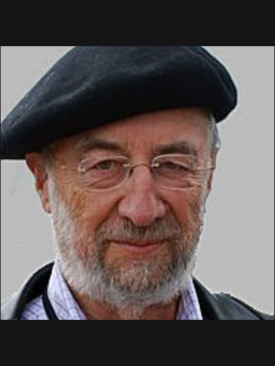
I will always remember Bernard Spolsky as one of the three persons who constituted what I perceived to be the Jewish trinity of sociolinguistics: Joshua A. Fishman, Robert Cooper, and Bernard Spolsky. Bernard Spolsky was a good family friend of my mentor and intellectual father, Joshua A. Fishman. As I learned about sociolinguistics, I read Spolsky’s work in interrelationship to that of Fishman and Cooper. In the early 1980s, these three Jewish friends and colleagues taught me much about sociolinguistics, language planning and policy, bilingualism, and bilingual education. But as a Cuban-born Catholic Latina New Yorker, the “Jewish trinity” also taught me much about the languaging of Jewishness and its people.
Out of the three, Spolsky intrigued me the most. Here was a Jewish man born in New Zealand, interested in Māori revitalization but also supportive of the language rights of Navajos and Mexican Americans in the Southwest. He showed interest not only in families and communities but also in education, including bilingual education and TESOL. And although he had studied at McGill, he was not in any way convinced by the so-called success of Canadian immersion programs.
By the time I came across Spolsky’s work in the early 1980s, he was already living in Jerusalem, where he went on to do important work on language policy and management. Yet the lessons I learned from his early work have always stayed with me. Perhaps the most important one was about King Canute trying to stop the waves, an image he used in many scholarly presentations. He deeply understood that it was impossible to control the languaging of people, and like King Canute, it was his humility as a scholar and teacher and his humanity that has made Bernard Spolsky’s work majestic.
I only have space here to reflect on what I learned about the education of racialized bilingual children from one of Bernard Spolsky’s early publications, The Language Education of Minority Children (1972). There are five ideas in this early work that resonate in my own translanguaging work and in that of colleagues today who focus on raciolinguistic ideologies. I identify them here, followed by Spolsky’s own words on each position:
-
That minoritized children do language with a rich and complex repertoire. Language education, Spolsky says, “does not start from nothing” (p. 2). And he adds: “There is no justification for the myth that children of lower socioeconomic class speak no language, or an inferior one, or a debased and inaccurate form of the standard language. Such children have learned the variety of language to which they have been exposed, a variety with as much semantic richness, structural complexity, and potential for communication as any other” (p. 4).
-
That the problem of education is not students but the school itself. The supposed language barrier of language minoritized students, Spolsky says, is “established by the school itself” (p. 3).
-
That language educators tend to see their task as teaching language and not teaching children. Anticipating by half a century the move that translanguaging has afforded applied linguistics, Spolsky clearly says that a teacher’s task is not simply teaching language: “they have not realized that it is teaching students to use language” (p. 194).
-
That social problems are not linguistic; they are economic and racial. Beyond schools, Spolsky claims that social structures of racial and economic discrimination are responsible for what are considered linguistic programs. He clearly states: “Linguistic problems are a reflection of social problems rather than a cause” (p. 194). And speaking about the emphasis of schools to teach literacy for success, Spolsky reminds us: “[U]nemployment patterns are not controlled by linguistic, but by economic and racial factors. A Mexican American is out of work not because he can’t read, but because there is no work or because the employers don’t hire Mexicans” (p. 194).
-
That language is often used as an excuse for discrimination. Spolsky calls us to distinguish between “language as a reason and language as an excuse for discrimination” (p. 194). With prophetic vision that echoes the recent work of Flores and Rosa on raciolinguistic ideologies and the white listening subject, he continues: “Language is used as an excuse, like race or skill, color, or sex, for not hiring someone. No amount of language training will change this, for the discrimination exists in the hearer and not the speakers” (my italics, p. 194).
In Bernard Spolsky, we have lost a sociolinguist who never lost sight of the interrelationship between social structures and language. Like King Canute, Spolsky worked to unleash everyone’s waves of tongues, as he called attention to the role of dominant social structures in the silencing and restriction of the voices of so many. The legend says that King Canute was remarkable in his humility, and that is what made him magnificent. Sociolinguistic history will remember Bernard Spolsky in similar ways—a generous sociolinguist and teacher, accessible at all times to so many, with ideas that were prophetic then and that will guide us in the future.
References
Spolsky, B. (1972). The language education of minority children, and the limits of language education. In Spolsky, B. (ed.). The Language Education of Minority Children. Newbury, pp. 1–12, 193–199.
Spolsky, B. (1973). Review. Bilingual education of children: The St. Lambert experiment. TESOL Quarterly 7(3), 321–325.
New Executive Committee Elected Officials
The results of our 2022 AAAL election are in, and we are pleased to welcome three new members to the AAAL Executive Committee (EC): Manka Varghese, 2nd Vice President; Elizabeth (Liz) Miller, Member-at-large; and Shawn Loewen, Fund for the Future of Applied Linguistics (FFAL) Trustee.
Manka Varghese is a Professor in Language, Literacy, and Culture and Chair of Teaching, Learning, and Curriculum at the University of Washington’s College of Education. Her research, teaching, and mentoring revolve around developing anti-oppressive frameworks and pedagogies in language teacher education, especially for teachers of multilingual students, which integrate teacher and student intersectional subjectivities and identities theoretically and practically. Varghese has been an active member of AAAL since 1995 and has taken on many formal roles in the association. She aims to encourage more applied linguistics scholars of color, both practitioners and researchers, as well as those who can contribute to integrating racial and linguistic justice and community-driven perspectives to participate in the organization.
Elizabeth (Liz) R. Miller is a Professor in the Department of English at the University of North Carolina at Charlotte. Her research has examined the roles of identity, ideology, and agency as they relate to the experiences of adult immigrant learners of English. More recently, she has explored the role of agency and emotions in language teacher practice and identity. Miller regards AAAL as her primary professional society and has attended nearly every annual conference since 1999, becoming an increasingly active member over the past decade. She is committed to creating an inclusive professional society that advances the work of applied linguists around the world as well as in North America.
Shawn Loewen is a Professor at Michigan State University in the Applied Linguistics Program in the Department of Linguistics, Languages, and Cultures. His research interests include instructed second language acquisition (ISLA), second language interaction, and quantitative research methodologies. Loewen joined AAAL as a graduate student when he presented his first paper at the 1998 Seattle conference and has been a member and regular presenter ever since. He believes that one of the best ways for him to foster positive change in our world is through investing in the lives of students and junior scholars in our field, and he looks forward to serving and making a difference in young scholars’ lives.
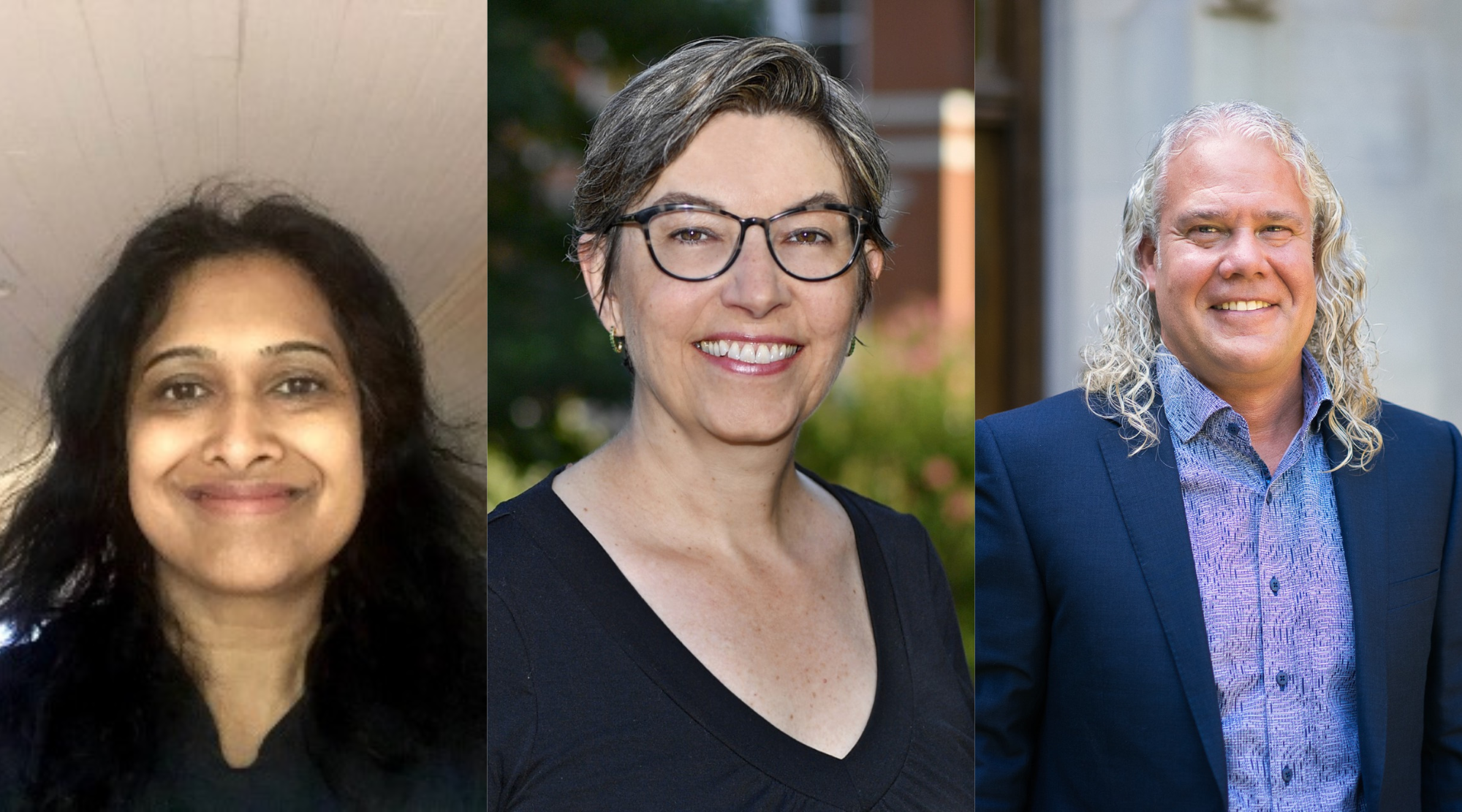
Each of these new leaders will take office immediately following the Annual Business Meeting in March 2023. We thank them for their service and wish them well in their new roles! You can find more information about each of our new EC officials as well as information about those elected to other AAAL committees on the AAAL website.
AAAL Membership at a Glance
Update from the AAALetter Editorial Team
Each year, AAAL compiles data on our membership—where we live, our research and teaching interests, our conference and event participation, and much more. We, the editorial board members of the AAALetter, thought these data may be of interest to the broader membership, that they might learn more about the people who comprise AAAL. To that end, we have created the following infographic (based on third-quarter 2022 data) to share information about our membership total, member locations, U.S. vs. international membership, and membership types.
You can access the PDF version here or by clicking the image below.

